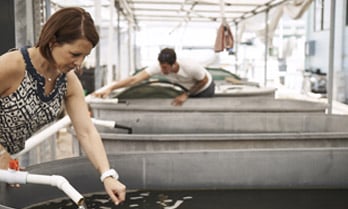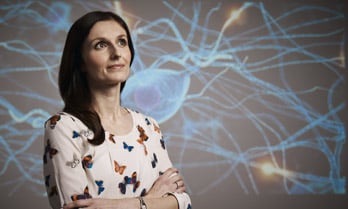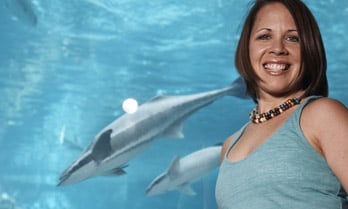Dr Tracy Ainsworth, James Cook University
01 September 2011
The complex life of coral
Tracy Ainsworth’s research is changing our understanding of the life of the tiny coral animals that built Australia’s iconic Great Barrier Reef.
At the time she won her L’Oréal For Women in Science Fellowship Tracy had already demonstrated that the interactions between corals, their communities and their environment are far more intricate and subtle than we ever imagined.
She has shown, for instance, that bacteria as well as algae play a significant role in the life of the coral and in how it responds to changing temperatures. She has also found that coral bleaching is a far more complex process than previously thought. And she’s done so by applying skills in modern cell biology which she picked up working in neuroscience laboratories.
Her L’Oréal For Women in Science Fellowship allowed her to study the low light, deep water reefs that underlie tropical surface reefs at depths of 100 metres or more.
Qualifications
2008 – PhD (Microbiology and cell biology), University of Queensland
2001 – Masters of Science (Immunology), James Cook University
1998 – Masters of Science qualification, James Cook University
1996 – Bachelor of Science (Marine Biology/Aquaculture), James Cook University
Career highlights, awards, fellowships, grants
2011-2013 – Australian Research Council (ARC) Super Science Research Fellow, James Cook University
2011 – James Cook University Seed Research Grant
2011 – John and Laurine Proud 2011 Fellowship at Lizard Island
2010 – Journal of Experimental Biologist Travelling Fellowships Award
2009 – ARC Linkage Infrastructure (Equipment and Facilities) Grant, “Environmentally controlled infrastructure to investigate the effects of climate change on the Great Barrier Reef”, awarded to Munday, P.L., Willis, B.L., Miller, D.J., Leggat, W.P., McCormick, M.I., Baird, A.H., Ainsworth, T.D., Yellowlees, D., van Oppen, M.J. & Negri, A.P.
2009-2011 – ARC Postdoctoral Research Fellow (Senior), James Cook University
2009 – Australian Academy of Science International Linkages Award
2008-2009 – ARC Postdoctoral Research Fellow, James Cook University
2008, 2010 – Australian Academy of Science ARC Early Career Researcher Award
2008 – ARC/NHMRC (National Health and Medical Research Council) Network for Genes and Environment in Development Nominee Award
2008 – University of Queensland Dean’s Award for outstanding postgraduate
2007 – Australian Centre of Excellence for Reef Studies Publication Award
2007 – Visiting Faculty Member, Hawaii Institute for Marine Biology
2005 – Visiting Researcher, Tel Aviv University
2004-2008 – PhD Candidate, University of Queensland
2004 – Australian Postgraduate Award (Industry)
2002-2004 – Research Assistant Developmental Neurobiology, University of Queensland
2001 – Research Assistant Vision Touch and Hearing, Queensland University of Technology, University of Queensland
Research highlights
- More than 16 presentations at Australian and international conferences and institutions, including three invited conference and seminar presentations
- Twenty two publications in print and in press, including ten as first author, and co-authorship of two invited reviews, and one book chapter
- Invited Member of the USA National Centre for Ecological Analysis and Synthesis, Santa Barbara California Working Group Tropical coral reefs of the future: modelling ecological outcomes from the analyses of current and historical trends
Top five publications
Ainsworth, T.D., Gates, R. & Vega Thurber R. (2010) The Future of Coral Reefs: a microbial perspective, Trends in Ecology and Evolution 25(4):233-240. (Impact factor 14.1, 10 citations)
Ainsworth, T.D., Kvennefors, E.C., Blackall, L., Fine, M & Hoegh-Guldberg, O. (2007) Disease and cell death in White Syndrome of Acroporid corals on the Great Barrier Reef, Marine Biology 151(1):19-29. (Impact factor 2; 20 citations)
Leggat, W., Ainsworth, T., Bythell, J., Dove, S., Gates, R., Hoegh-Guldberg,O., Iglesias-Prieto, R. & Yellowless, D. (2007) The coral hologenome theory disregards the coral holobiont, Nature Reviews Microbiology5(10):doi:10.1038/nrmicro1635-c1. (Impact factor 15; 9 citations)
Ainsworth, T.D., Fine, M., Roff, G. & Hoegh-Guldberg O. (2008) Bacteria are not the primary cause of bleaching in the Mediterranean coral Oculina patagonica, The ISME Journal 2:67–73; doi:10.1038/ismej.2007.88). (Impact factor 6.3)
Leggat, W.P., Ainsworth, T.D., Seneca, F., Wasmund, K., Miller, D., Ukani, L., Yellowlees, D. (in press). Expression of both host and symbiont stress response genes reveals the molecular control of progressive heat stressors in the coral symbiosis. In revision PLOS One. (Impact factor 6.1)




